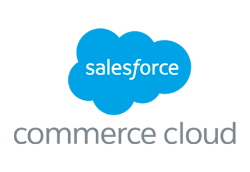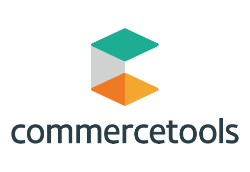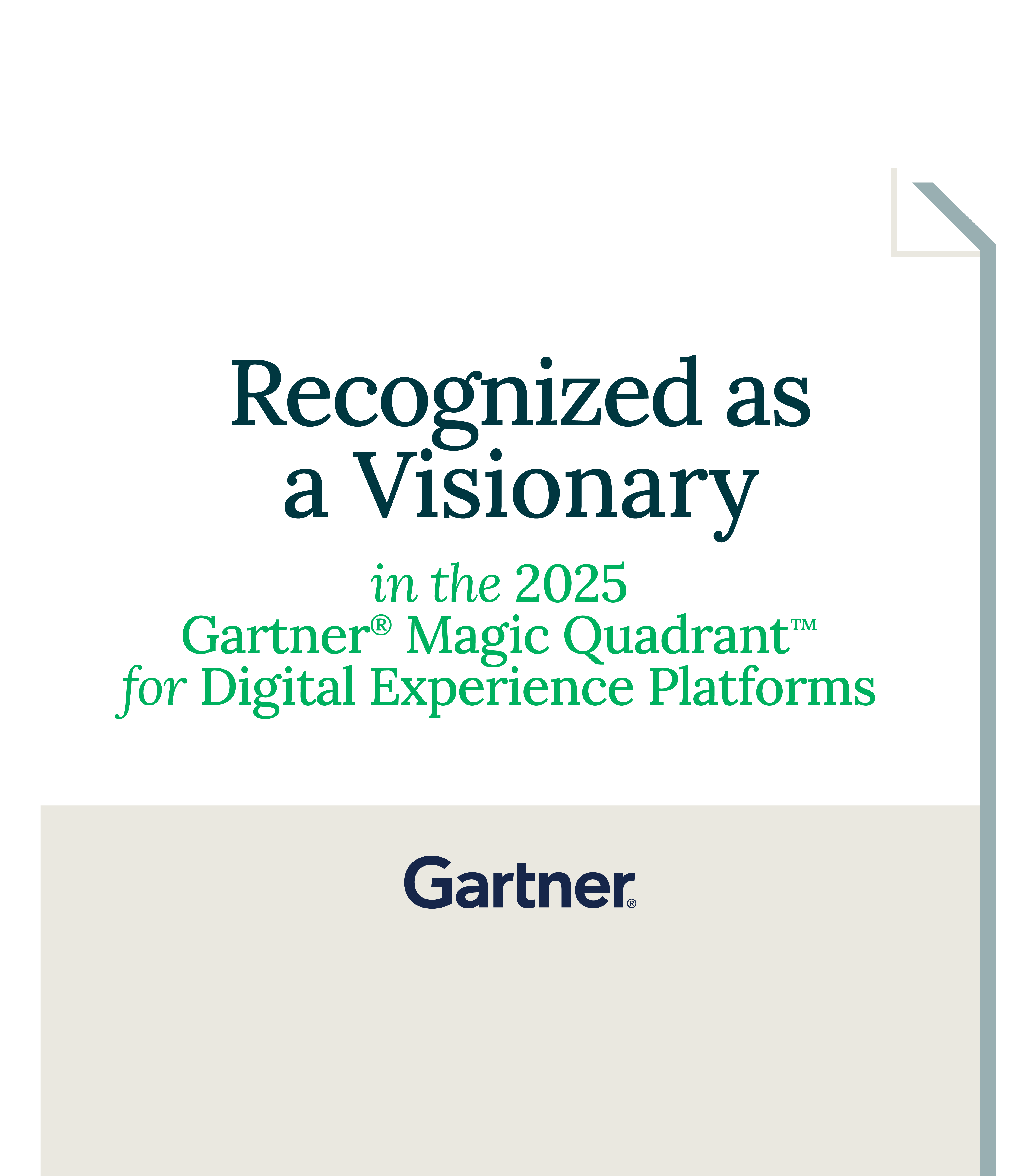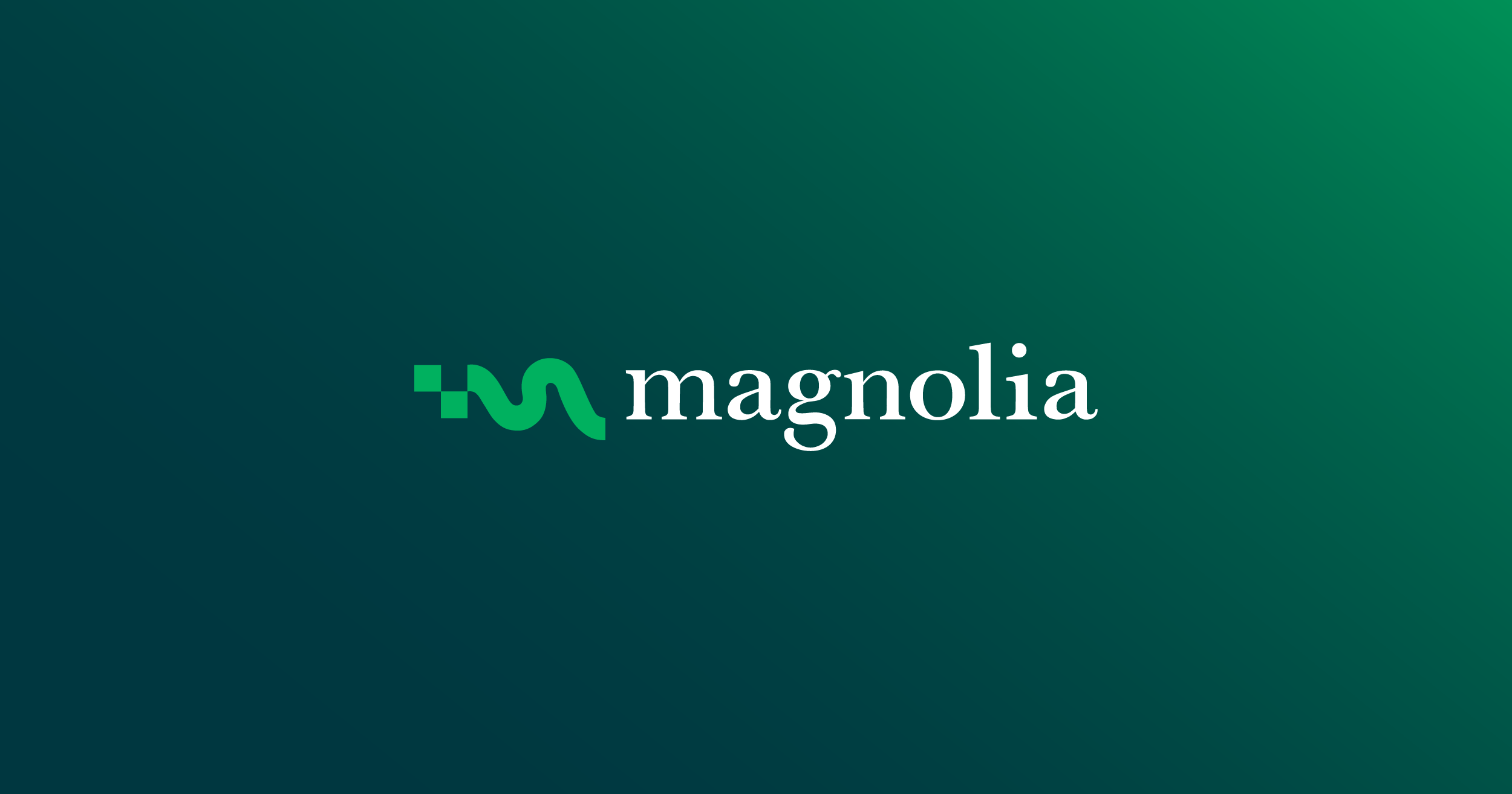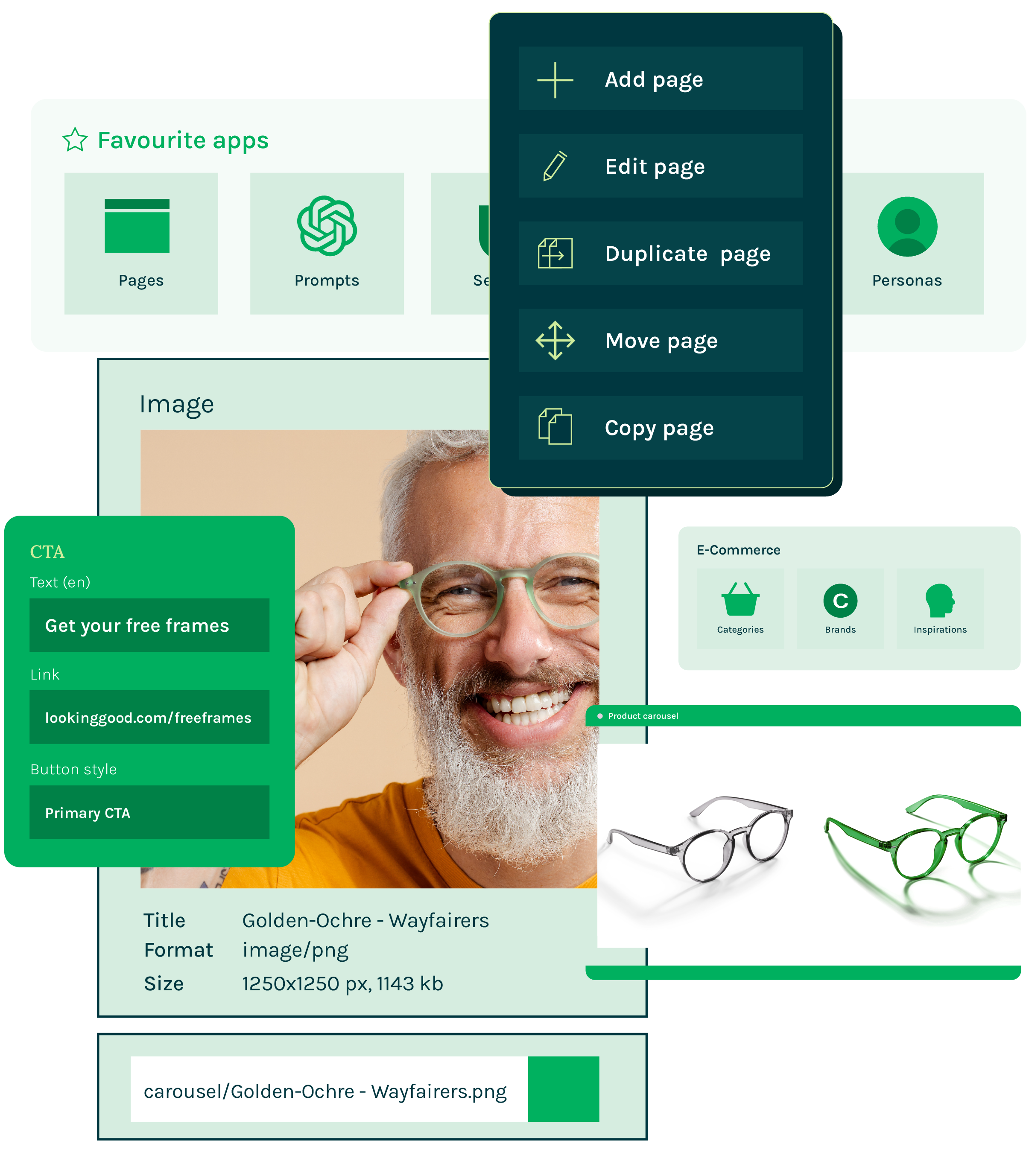
Magnolia for ecommerce
Create better ecommerce experiences
Most Ecommerce systems excel at managing product data and capturing transactions. Providing dynamic, personalized experiences for the modern customer is still the domain of content management solutions.
With its best-in-class Headless CMS, Connector Packs, and Headless Accelerator, Magnolia helps you create harmonious multi-channel shopping experiences from product description to check-out—from one unified platform or DXP system.
What is your ecommerce challenge?

Big marketing goals but your ecommerce CMS is limiting you?
Add Magnolia’s to your ecommerce setup for a richer, more engaging shopping experience that increases sales.

Time to hit reset on your current ecommerce set-up?
Compose your ecommerce stack with Magnolia’s DXP and get transformative speed and future-proof flexibility.
True fusion of content and commerce
Whether you’re looking to switch to a new ecommerce CMS, or completely re-platform your ecommerce architecture, Magnolia is a perfect fit to deliver modern shopping experiences for your buyers and empower both your marketers and developers. Watch our demo video to learn more.
Rich shopping experiences
Create engaging shopping experiences beyond simple storefronts. Easily combine CMS and Ecommerce content to create compelling stories around your products, and pages with true call-to-action capabilities.
Personalization
Grow engagement and conversions by creating highly personalized ecommerce experiences that are aligned with your shoppers’ intent with the help of AI-driven search, merchandising and recommendations.
Multi-channel campaigns
Compose landing pages and campaigns with full WYSIWYG editing, scheduled publication, and multi-device preview. Manage the entire customer experience of a targeted campaign in one place, without touching any code.
Tied-in analytics and optimization
Track the performance of your content and campaigns, and see the insights without ever having to leave your Magnolia screen. With our native A/B/n Testing and embedded analytics, you can easily convert more visitors into buyers.
Responsive assets
Create rich-media ecommerce experiences for any device with our Image Focal Points. Your buyers will discover products in a realistic meaningful context, and get the best view no matter what device or screen resolution they are using.
Global rollouts
Deliver your experiences across multiple sites and languages. Use our Live Copy feature and automatic translations to create globally consistent experiences with the local nuances needed to compete with home-grown competition.
Fast, flexible, and future-proof

Speed up your storefront creation
Go headless and reap the benefits of speed, flexibility and top-notch end-user experiences. Instead of starting from scratch, start creating your storefront and other headless experiences with our ready-made Web Components.

Connect your entire stack
In addition to connecting your CMS and ecommerce platforms, Magnolia’s Connector Packs for Marketing Automation, DAM, Analytics and Optimization let you build a modular and unified digital experience platform (DXP), with best-of-breed tools.

Scale at peak performance
Get stellar performance, high availability, and robust security from Magnolia’s cloud solutions. Our APIs make it easy to integrate Magnolia with other ecommerce services in the cloud.
More ecommerce success stories


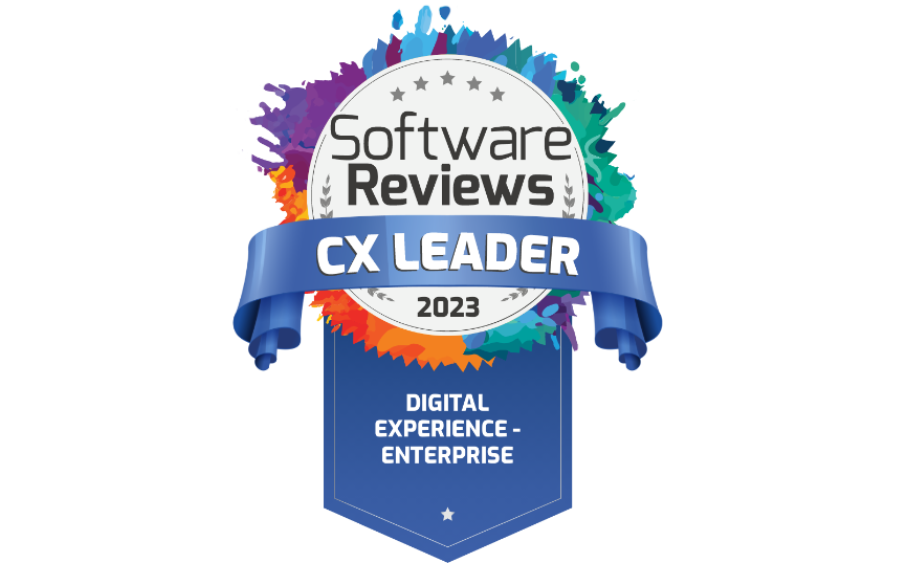

FAQs
What is a CMS platform?
A CMS platform, also known as a Content Management System platform, is a software application or framework that enables users to create, manage, and publish digital content without requiring extensive technical expertise. The content management world has always been filled with acronyms to help simplify things. However, CMS, WEM, and DXP aren’t just fancy buzzwords; see how the industry requirements have evolved.
What does CMS bring to ecommerce?
With a robust CMS (Content Management System), ecommerce businesses can enhance the product experience, leverage content marketing strategies to engage their target audience, personalize the user experience with recommendations, optimize their sites for search engines through SEO tools and analytics, streamline operations with efficient inventory management and order processing, and ultimately drive sales and business growth. Additionally, CMS platforms often offer features like custom pricing options, enabling businesses to tailor pricing strategies to specific customer segments, contributing to increased customer satisfaction and business success.
The marketing features provided by CMS platforms further empower businesses to create targeted campaigns, track performance metrics, and refine their marketing strategies for optimal results.
What are the different types of CMS?
Headless vs traditional
The preference between a headless CMS and a traditional CMS relies on clear requirements and priorities. Headless CMS provides greater flexibility, omnichannel delivery, and customization options but requires additional development effort. Traditional CMS platforms offer simplicity, pre-built templates, and ease of use but may have limitations in customization and omnichannel delivery.
Cloud-based vs on-premises
Cloud-based CMS presents convenience, scalability, and cost efficiency, while on-premises CMS provides control, customization options, and security advantages.
Open source vs proprietary
Open source offers freedom, customization options, and community support, while proprietary provides vendor support, enhanced security, and a cohesive software ecosystem. Learn more about the open-source vs proprietary DXPs.
Does Magnolia integrate with my ecommerce platform?
The answer is a bit complicated and depends on which platform you’re using.
But yes. With our Commerce Connector Pack, you can natively extend Magnolia into your ecommerce platform of choice.
This means you can use your ecommerce content as if it were native Magnolia content – while keeping the cataloging features and order functionality of your ecommerce solution.
We have ready-made connectors for tools such as Salesforce Commerce Cloud, Commercetools, SAP Commerce, and Adobe Commerce. And with our APIs, you can connect Magnolia to any ecommerce platform you want.
Check out the video here, where Jan shows how Magnolia and Salesforce Commerce Cloud work together.
I already have an ecommerce platform. Would Magnolia make sense to me?
If you have both an online store AND a brand website, then yes.
Let’s explain:
Ecommerce platforms are built to create and manage an online store and the related sales processes. It’s a different animal than a brand website – and the requirements for each differ.
A brand website, for instance, would often need pages such as ‘about us’, careers, customer service, and product categories. You’d also want to be able to create specific product or campaign landing pages.
Many ecommerce systems provide basic website builders but do not offer the content management capabilities and integrations that brands need to create seamless, competitive digital experiences. So many businesses choose to have both an ecommerce platform and a CMS.
This presents a new problem: With two separate systems, you risk creating a disjointed customer experience:
- The shop looks different from the brand's website
- The search function does not work across both
- The shopping cart disappears when users go from shop pages to brand pages.
The Magnolia Digital Experience Platform (DXP) solves both challenges by offering advanced content management capabilities AND tightly integrating with other DX systems, such as your ecommerce system so that you can create a unified shopping experience across the entire customer journey.
How does Magnolia work with my ecommerce platform?
Magnolia provides Connector Packs to many popular ecommerce systems, such as Salesforce Commerce Cloud, Commercetools, SAP Commerce, and Adobe Commerce.
Our integration framework also makes it easy to integrate with other ecommerce systems, including composable commerce and legacy systems.
Magnolia’s integration options connect Magnolia with your ecommerce platform, so that your content authors can use your ecommerce content within Magnolia – while your product catalog and sales functionality remains with your ecommerce solution.
With a unified platform like this, you can create an experience that is equally great no matter if customers came to browse or shop. The optimized customer experience also increases your conversion rates and average order value.
Does Magnolia offer personalisation and A/B testing?
Yes. Personalisation and A/B testing is available natively or via third-party software. Magnolia’s native features enable most use cases, including those of large retailers such as Sainsbury’s.
If you have more advanced needs, we support a composable approach that lets your marketing team use their favorite software for personalization and A/B testing.
Is Magnolia a headless CMS? How will this impact our non-technical users?
Magnolia is a hybrid-headless CMS. This means that you can use it as a headless CMS or as a traditional CMS. When using Magnolia as a headless CMS, you manage content via APIs. Whereas when using Magnolia as a traditional CMS, Magnolia renders and serves your pages directly.
The hybrid-headless approach gives you ultimate flexibility: You can decide on a project-by-project basis whether you want to build your own frontend (headless) or make this decision for all of your digital channels at the time of your CMS purchase.
Either way, your non-technical users keep their creative control. Content authors get an easy-to-use visual interface including a WYSIWYG editor that lets them use Magnolia like a traditional CMS, even when using it in headless mode. If you don’t tell them, they won’t even know it’s headless.
Does my marketing team need technical skills to work with Magnolia?
We built Magnolia so that your marketers can do lots without needing the help of IT. Once your developers set up the platform, component templates, and content apps, your marketers have creative control via a visual in-line editor that’s easy to use.
They can preview and publish experiences with the click of a button, making it fast and simple to create new content, including product and landing pages.
Do I have to ditch my existing tech stack in order to work with Magnolia?
No, not at all. You don’t have to ditch your existing tech stack in order to build a modern ecommerce experience.
Continue working with the tools you know and like – and just integrate them with Magnolia. As a composable CMS, you can change or swap out any tool at any time you want.
Do you have a campaign feature?
Yes. You can build landing pages and campaigns with full WYSIWYG editing, scheduled publication, and multi-device preview. Basically, you can manage the entire customer experience of a targeted campaign in one place, without touching any code.
I have more questions – what do I do?
Great! We’ll be happy to help answer any questions you have. Get in touch with us here, and we’ll do our best to help you out.




